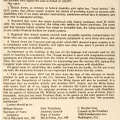The
Handicapped
Coloradan
ADAPT wins transit access
VlCTORY!
Federal court orders all new buses
to be equipped w|th wheelchair lifts
APTA pressures DOT
to appeal decision
Feb. 13,1989.
Call it V-D Day. Victory over the Department of Transportation (DOT).
Or call it V-A Day. Victory over the American Public Transit Association (APTA).
Because on that day in Philadelphia, within earshot of the Liberty Bell and walking distance of the hall in which the Declaration of Independence was forged, disabled Americans won not only the right but the means to ride mainline public transportation.
On a 2-l vote, the U.S. Court of Appeals for the Third Circuit ruled that in the future every transit system in the nation that buys buses with assistance from the DOT must purchase only buses equipped with wheelchair lifts.
That decision reverses a 1988 ruling by U.S. District Judge Harold Katz who upheld DOT’s policy of allowing transit systems the “local option" of providing public transit to people with disabilities through a paratransit system.
APTA, which reaffirmed its support of local option at its last national convention, has urged DOT to appeal the decision to the U.S. Supreme Court. Such an appeal must be filed within 90 days, or by May 13, 1989.
DOT already has filed for a rehearing, and the court is expected to announce by March 29 if they would be willing to reconsider the decision. Justices Carol Los Mansmann and A. Leon Higginbotham wrote the maiority opinion with Judge Morton Greenber dissenting.
The case was brought to the Court of Appeals by a dozen disability rights organizations, led by the militant American Disabled for Accessible Public Transit (ADAPT) and the Eastern Paralyzed Veterans of America. Timothy M. Cook, director of the newly formed National Disability Action Center, argued the case.
It wasn't the first time wheelchair lifts have been in the courts. in 1979, the DOT, at the direction of President Jimmy Carter, ordered all transit systems to install lifts on new buses, but that mandate was struck down in federal court after an appeal by APTA.
APTA’s insistence on local option led to the creation of ADAPT by a handful of militant wheelchair users in Denver, who set up pickets outside the Hilton Hotel headquarters of APTA's I983
national convention.
At the insistence of Mayor Federico Pena, ADAPT was allowed to speak before the convention and no arrests were made. That was the last time either situation would exist.
At every subsequent national convention or regional APTA meeting, wheelchair militants have shown up in force, blocking buses and hotel entrances until local police forces were forced to cart them away to jail.
“Who would have thought a bunch of ragbag crips from Denver could have started something that would have grown this big?" asked ADAPT founder Wade Blank, co-director of the Atlantis Community, a local independent living agency.
Both Blank and Cook cautioned that the war was not over yet, although both said they were pleased that the 73-page court opinion was filled with the language of the civil rights movement and would go a long way toward convincing those on the fence that their cause was just.
The Court of Appeals opinion reads, in part: “We find the goal of eradicating the ‘invisibility of the handicapped‘ led Congress to enact measures to facilitate, if not immediate and complete mainstreaming of the handicapped, then affirmative and aggressive steps in that direction."
The decision involves only new buses, as the justices argued that requiring systems to retrofit old buses would subject them to "undue burdens."
Cook said after the decision was handed down that the "opinion is completely consistent with President Bush's call last week, in his speech before Congress, for Americans with disabilities to be ‘in the economic mainstream.‘ Nothing is more essential to meeting that goal than the provision of accessible public transportation."
Mike Auberger of the Denver ADAPT chapter, who's been arrested in several cities while engaging in civil disobedience,
agreed that accessible public transit is the key to enabling disabled people assume full citizenship.
"People are dying out there," Auberger said. "Disabled people go into nursing homes because they don't have any options. I personally know people who have committed suicide because they don‘t have any options. Wheelchair lifts will give them that option."
Auberger said that ADAPT doesn't plan to rest on its laurels. They'll be Reno April 7-ll for a regional APTA convention and back in Denver April 23-26 for the national meeting of the Urban
Mass Transit Association (UMTA).
“Our demand is simple," Auberger said. “We just want them to drop the appeal process and accept the decision." If they don't, Auberger promised that protesters would try to fill the jails one
more time.
To that end, ADAPT members intend to picket DOT offices in 12 cities on Good Friday, March 24, and ask staff members there to call the Presidiential assistant in charge of transportation matters and ask that the court decision not be appealed. "If they don't make the call, then we don't go," Auberger said.
"I'm sure we'll take some heat because we're doing it on Good Friday," he said, explaining that he expects many offices to be shorthanded because of workers leaving early for the Easter weekend. "That should just add to the confusion."
- Created on
- Friday 12 July 2013
- Posted on
- Friday 11 September 2015
- Tags
- 3rd US Circuit Court of Appeals, ADAPT, APTA, civil rights, DOT - Dept of Transportation, EPVA, local option, Mayor Federico Pena, Mike Auberger, National Disability Action Center, President Jimmy Carter, Tim Cook, Wade Blank, wheelchair lifts
- Visits
- 3664
- Rating score
- no rate
- Rate this photo

0 comments